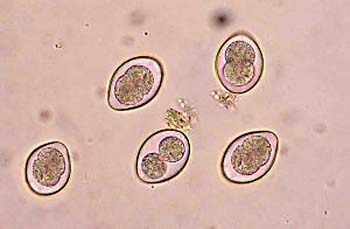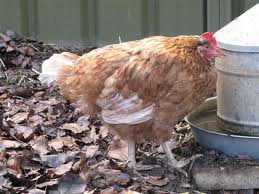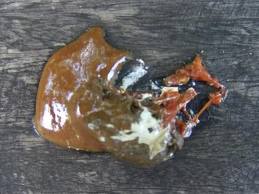Yesterday, spring sprung. It was the warmest, sunniest, “springiest” St. Patricks day ever! There were people in green t-shirts and shorts all over the place. Shorts….in March….in Ontario, Canada. This has been the year of the absent winter, and so I guess it shouldn’t surprise me that spring has come early. I’m guessing that the spring has caught some backyard hen keepers a little by surprise. There are some things that you should keep in mind, if you have hens outdoors this time of year.
All the organisms in your backyard are waking up….the water is sinking into the lawn, melting the frost, and sparking growth in plants, flowers, worms, bugs and all sorts of good things. Unfortunately, along with all the good things, the nasty things in your yard are also waking up and rearing their ugly heads. In terms of backyard hens, the big risk is parasites that have been lying dormant or under control all winter, that are bound to become more of a challenge for the flock as the weather gets warmer and wetter.
Coccidiosis is by far the biggest concern for backyard chickens. Coccidiosis is a disease that encompasses a bunch of different “bugs” that live in the intestines of the bird, and are deposited in the environment every time the bird poops. According to wikipedia, coccidia ” is a subclass of microscopic, spore-forming, single-celled obligate intracellular parasites belonging to the apicomplexan class Conoidasida.” Hope you got that. In english, coccidia are small parasites that MUST live inside the intestine cells of animals (in this case, chickens). The interesting thing is that they produce spores when they reproduce. A spore makes a cockroach look like a frail butterfly. Nuclear war, napalm and fire-breathing dragons are the only reliable ways to kill cocci spores. This means that if you have chickens, you WILL have cocci spores in the area in which they live. Spores start to develop and become infective after they get moist.

Cocci under a microscope. The shell around the 2 organisms is INCREDIBLY tough, and can live in your soil for months to years before it becomes infective.
Depending on how you manage your coop, now is the time that any build up of manure from over the winter will have the best chance of getting wet. Also, any fresh droppings this time of year will sporulate almost immediately, since most chicken runs at this time of year are bound to have muddy areas. Although treating coccidiosis is usually relatively effective, depending on the strain of cocci you have, and what other bacteria are present in your environment, birds can become very ill very quickly if coccidiosis gets going in your flock. For this reason, it is best to manage the problem before it happens, since responding to it is sometimes too late.

This is a milder stage of coccidiosis. She just looks "off", with ruffled feathers, a shrunken comb, and droopy wings. She will be contaminating the environment for the other hens.
If at all possible, move your chicken run regularly. Any area that is consistently fouled with manure will eventually become severely contaminated with bacteria, viruses and parasites, so this is a good management practice regardless. You should make it a special priority to move the run in the spring, however. Because of the “load” that has built up over the winter, the disease challenge during spring thaw and muddy period is especially high. If you can get the hens to a clean area for several weeks until the yard dries up, you can prevent most of the parasite infections, and the severe illnesses that can follow coccidiosis infection, which can result in sudden death in affected hens.

This is a severely affected pullet. Notice the ruffled feathers, closed eyes...you can imagine how quiet and depressed she will act
If your birds do get coccidiosis, you will see chickens that look ruffled, rough coated, lethargic and will want to spend a lot of time sitting around. Sometimes they will lay on their sides to keep pressure off their sore stomachs. Their droppings will range from diarrhea to green paste, to blood tinged loose manure to black blobs that are made primarily of digested blood.
If you see any of these signs, quick response is important. Besides not wanting you birds to be sick, it’s important to treat the birds because they are full of cocci, and they are vigorously contaminating the run and coop, putting all the hens at greater risk of getting sick. If you do get coccidiosis, it is most effective to treat the entire flock, since sub-clinical cocci is very common. If you treat individual birds, you will just get one better, then another will come up sick. If you treat them all, you break the life cycle of the bug, and the hens can get back to normal.
So remember, keeping the hens’ environment dry and clean will prevent many infections from occurring. I realise this can be very difficult, depending on the weather, but the effort is worth it. Also, treating the entire flock at the first sign of infection will help prevent more hens from coming down with the disease.
Mike the Chicken Vet


The last dropping pictured was produced by an adolescent pullet being reared in Wollongong in the height of the Australian summer. It was hot and wet at the time and the flock was free ranging in an area where there were wild birds as well. The photo was apparently taken after a week of treatment with Sulphaquinoxaline. That medication is becoming a lot less effective here now and a lot of people are using Baycox or Amprolium. Coccidiosis is a horrible condition. We go to great lengths to prevent it.
How is this diagnosed? Should I take my “ruffled, rough coated, lethargic and will want to spend a lot of time sitting around” hen to the vet? Or, should I just treat her?
Thanks!
So do they need an anti parasitic medication ot antibiotic? I prefer to treat without pharmaceutical drugs as I believe they are toxic.
Hi LC;
for coccidiosis, an anti-coccidial drug is the treatment of choice. If you do not want to treat, birds can develop immunity to cocci, over time. The important thing is to keep secondary infections under control, and by lowering the pH of the gut with something like vinegar, you can help the hens. There is a risk in doing this, that you avoid by treating with a drug like Amprolium, or one of the coccidiostats available, but it is up to you. It is notable that the vast majority of pharmaceutical drugs are actually of plant origin, so I’m not sure which drugs you are uncomfortable with.
Mike
Hi Mike,
Thanks. I’m not comfortable with any of the pharmaceuticals. They may have had their origin in nature, but synthesized, it harms the body. I believe it’s best to build up the immune system (epigenetics) rather than tear it down with pharmaceuticals. Silver, kefir or medical ozone can do wonders for their immune systems and kill the pathogens.
Pingback: The first death on the farm | The Dairy Queens
what about using a coccidiostat, because its difficult to rely on sanitary practices alone. or is it not suitable to give antibiotics to prevent disease incidence.
Hi Vasuki,
I’m not sure where you are, but here in Canada, there are no coccidiostats that are approved for use in laying hens, because of drug residue concerns.
Mike
We are looking to treat our flock for this due to one pullet’s behavior. About one month ago we treated her effectively for sour crop but she hasn’t “been the same” since. Loss of appetite, small, pale comb, loss of energy. … she just stands around. We separated her as soon as we recognized the sour crop issues. Any suggestions? If it is coccidiosis would she have died already? Thank you!
Hi Jess,
As a rule, coccidiosis affects a large percentage of the flock. Unless this Pullet is the only susceptible one in the flock, it is more likely that her problem stems from the sour crop, rather than cocci. I also usually recommend not treating birds that don’t show signs of needing it. I suggest you take your individual “sicko” to a vet to investigate, rather than treating the flock blindly.
Mike